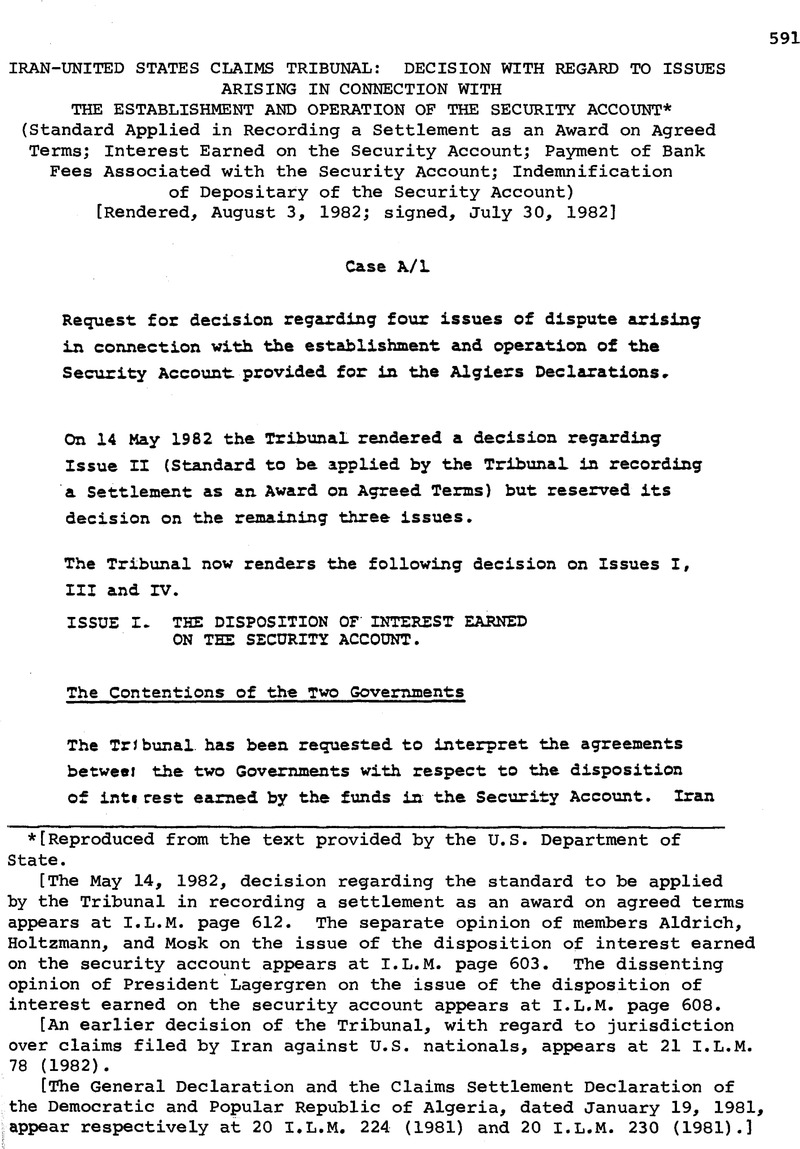No CrossRef data available.
Published online by Cambridge University Press: 04 April 2017

[Reproduced from the text provided by the U.S. Department of State.
[The May 14, 1982, decision regarding the standard to be applied by the Tribunal in recording a settlement as an award on agreed terms appears at I.L.M. page 612. The separate opinion of members Aldrich, Holtzmann, and Mosk on the issue of the disposition of interest earned on the security account appears at I.L.M. page 603. The dissenting opinion of President Lagergren on the issue of the disposition of interest earned on the security account appears at I.L.M. page 608.
[An earlier decision of the Tribunal, with regard to jurisdiction over claims filed by Iran against U.S. nationals, appears at 21 I.L.M. 78 (1982).
[The General Declaration and the Claims Settlement Declaration of the Democratic and Popular Republic of Algeria, dated January 19, 1981, appear respectively at 20 I.L.M. 224 (1981) and 20 I.L.M. 230 (1981).]
* Such a majority is reouired by Article,31 paragraph 1 of the Tribunal Rules. See Sanders, Commentary on UNCITRAL Arbitration Rules,II [1977] Yearbook - Commercial Arbitration 172, 208.
* See also Ambatielos Case (Greece v. U.K.) Anglo-Greco Commission of Arbitration, 12 R. Int'l Arb. Awards 82, 108 (1956) (“Naturally [the treaties'] wording was influenced by the customs of the period, and they must obviously be interpreted in the light of this fact.”)
* Iran's unexpressed expectations cannot be enforced absent an objective manifestation in the Declarations of such expectation. See Fitzmaurice, The Law and Procedure of the International Court of Justice 1951-54; Treaty Interpretation and Other Treaty Points. 1957 Brit. Y.B. Int'l L. 203, 206.
* Cf. Webb's Fabulous Pharmacies, Inc v. Beckwith, 449 U.S. 155, 162 (1980) (the United States Supreme Court stated that “the usual and general rule is that any interest on an interpleaded and deposited fund follows the principal and is to be allocated to those who are ultimately to be the owners of that principal.” (Emphasis added))
1 Compare the flexible interpretation- of an ambiguous treaty stipulation which the International Court of Justice applied in the Case concerning rights of nationals of the Dnited States of America in Morocco. The Court stated:
“In these circumstances, the Court, is of the opinion that Article 95 (of the General Act of Algiceras of 1906; added here) lays down no strict rule on the point in dispute. It requires an interpretation which is more flexible than either of those which arerespectively contended for by the Parties in othis case.” (Judgment of August 27th, 1952,I.C.J. Reports 1952, p. 211)
It might be added that the minority concluded that the text presented no ambiguity (Op. cit., p. 229).